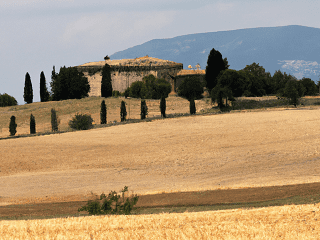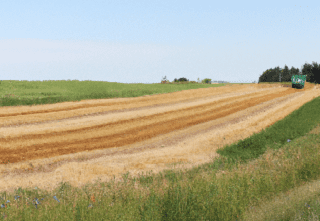Jobs and salaries on farms and in agriculture sector in Italy
Agriculture has always played a significant role in Italy's economy, culture, and history. Known for its lush vineyards, olive groves, and diverse range of crops, Italy is a world-renowned agricultural powerhouse. Agriculture accounts for a considerable portion of the country's GDP, provides employment to a significant number of people, and contributes to the country's overall economic growth.
In this article, we will explore the various jobs and career opportunities that are available in the agriculture and farming sectors in Italy. We will also delve into the challenges faced by those working in these sectors and the potential for growth and development in the industry. The article's aim is to provide a comprehensive overview of the agriculture industry in Italy, from its history and practices to the job opportunities and challenges faced by those working in the sector. So, whether you're an aspiring farmer, an agricultural scientist, or simply curious about the agriculture industry in Italy, read on to learn more.

Types of jobs in agriculture and farming in Italy
The agriculture and farming sectors in Italy provide a wide range of job opportunities for individuals with varying interests and skill sets. Here are some of the most common job categories within the industry:
1. Farm laborer jobs: Farm laborers are responsible for the physical labor involved in crop cultivation and harvesting. This includes tasks such as planting, weeding, irrigating, and picking crops. These jobs are often seasonal and may be physically demanding, but they offer a chance to work outdoors and gain experience in agriculture.
Read more: Farm workers in Italy - pay, job requirements, and other benefits.
2. Management and supervisory roles: Many farms require managers and supervisors to oversee day-to-day operations, including staffing, budgeting, and planning. These positions may require a degree in agricultural management or a related field and may involve overseeing multiple farms or regions.
3. Agricultural scientist and research jobs: Agricultural scientists and researchers work to develop new farming techniques, improve crop yields, and solve agricultural problems. These jobs typically require a degree in agriculture, biology, or a related field, as well as strong analytical and research skills.
4. Sales and marketing jobs: Sales and marketing professionals in the agriculture industry are responsible for promoting and selling agricultural products, such as wine, olive oil, and cheese. These jobs may involve working with distributors, developing marketing strategies, and attending trade shows and events.
Read more: 100 Jobs and careers in farming and agriculture industry
Overall, the agriculture industry in Italy offers a variety of job opportunities for individuals with a range of skills and interests. Whether you prefer physical labor, management, research, or sales, there is likely a job within the industry that aligns with your career goals.
Salaries
Salaries on farms and in agriculture in Italy can vary widely depending on the job role, location, employer, and other factors. Overall, salaries in the agricultural sector in Italy are considered competitive and can provide a livable income for workers.
There are differences in salaries between different roles and jobs in the sector. For example, unskilled workers such as farm laborers or pickers generally earn lower salaries compared to skilled workers like farm managers or agricultural technicians. Additionally, the salary for a particular job can also depend on the specific crop or type of farm.
Location is also a factor that can affect salaries in the Italian agricultural sector. Salaries can be higher in certain regions or areas where the demand for agricultural labor is greater, or where crops are more valuable. Additionally, employers may offer different salaries and benefits depending on their location, size, and business practices.
Other factors that can affect salaries in the Italian agricultural sector include overtime pay, skills and experience, and the specific type of employment contract. For instance, seasonal workers may receive different salaries compared to those on full-time contracts.
Despite the variations in salaries, the agricultural sector in Italy provides a range of benefits to workers, including job security, social security coverage, and additional benefits such as health insurance and retirement plans.
Overall, while salaries on farms and in agriculture in Italy can vary depending on many factors, the sector provides competitive wages and opportunities for those who are passionate about farming and the rural lifestyle.
Here you will find salaries, job requirements, working conditions and benefits for selected farm and agriculture jobs:
- Fisherman
- Gardener
- Veterinarian
Challenges faced by those working in agriculture and farming in Italy
Despite the many opportunities available in the agriculture and farming sectors in Italy, there are also several challenges that those working in these fields must face. Here are some of the most common challenges:
1. Seasonal work and lack of job security: Many jobs in agriculture are seasonal, with demand for laborers varying throughout the year. This can make it difficult for workers to find consistent employment and income, and it may also make it challenging for farmers to find enough workers during peak seasons.
2. Low wages and difficult working conditions: Wages for agricultural workers in Italy are often low, and the work can be physically demanding and take place in difficult outdoor conditions. This can lead to high turnover rates and difficulty in retaining skilled workers.
3. Impact of climate change on agriculture in Italy: Italy is experiencing the effects of climate change, including rising temperatures and more frequent extreme weather events such as droughts and floods. These changes can have a significant impact on crop yields and quality, as well as the overall sustainability of agriculture in the country.
Overall, the challenges faced by those working in agriculture and farming in Italy can be significant. However, many in the industry remain dedicated to finding solutions to these issues, such as implementing sustainable farming practices, investing in new technologies, and advocating for better working conditions and job security for agricultural workers.
Types of crops and products grown in Italy and farming practices in Italy
The country's fertile soil and favorable climate make it an ideal location for a wide variety of crops. Some of the most popular crops grown in Italy include grapes, olives, tomatoes, wheat, rice, and citrus fruits. These crops are used to produce a diverse range of products, such as wine, olive oil, pasta, and pizza.
Most farming in Italy is done on family-owned or leased land, with modern technologies and equipment being used to improve efficiency and productivity.
One of the unique aspects of agriculture in Italy is the emphasis on quality and sustainability. Many farmers use organic and biodynamic farming practices to minimize the use of harmful chemicals and promote the health of the soil and crops. This focus on sustainable and ethical farming has made Italian agricultural products highly sought after around the world.
Opportunities for growth and development in the agriculture sector in Italy
Despite the challenges faced by those working in agriculture and farming in Italy, there are also several opportunities for growth and development within the industry. Here are some of the most promising areas of growth:
1. Potential for increasing exports of Italian agricultural products: Italian agricultural products are highly regarded around the world for their quality and taste. There is significant potential for the Italian agriculture sector to increase exports of these products, particularly to emerging markets such as Asia and South America.
2. Development of sustainable and organic farming practices: Consumers around the world are increasingly interested in products that are produced using sustainable and organic farming practices. Italian farmers have long been leaders in this area, and there is significant potential for growth in the production and sale of these products.
3. Technological advancements in agriculture and farming: Advances in technology are transforming the agriculture industry, with new tools and techniques being developed to improve crop yields and efficiency. There is significant potential for Italian farmers to adopt these technologies and stay at the forefront of the industry.
4. Government support for the agricultural sector: The Italian government has historically been supportive of the agriculture sector, providing subsidies and other forms of financial support to farmers. This support is likely to continue in the future, providing a stable and supportive environment for those working in agriculture and farming.
Overall, the agriculture sector in Italy is poised for growth and development in the coming years. By taking advantage of the opportunities outlined above, those working in the industry can help to ensure a sustainable and prosperous future for agriculture in Italy.

In conclusion, Italy's agriculture and farming sectors offer a wide range of opportunities for those seeking employment, from farm laborer roles to managerial positions, research and development roles, and sales and marketing positions. Despite the challenges faced by those working in agriculture and farming in Italy, such as seasonal work and low wages, there are also many opportunities for growth and development within the industry.
As the world continues to face environmental challenges such as climate change, the importance of sustainable and responsible agriculture practices is only increasing. By supporting and investing in the agricultural sector, we can help to ensure a sustainable and prosperous future for both the industry and the wider society.
Overall, Italy's agriculture and farming sectors play a crucial role in the country's economy and society. By recognizing the importance of these sectors and supporting those who work within them, we can help to ensure a bright future for agriculture in Italy and for the many individuals and communities who rely on it.